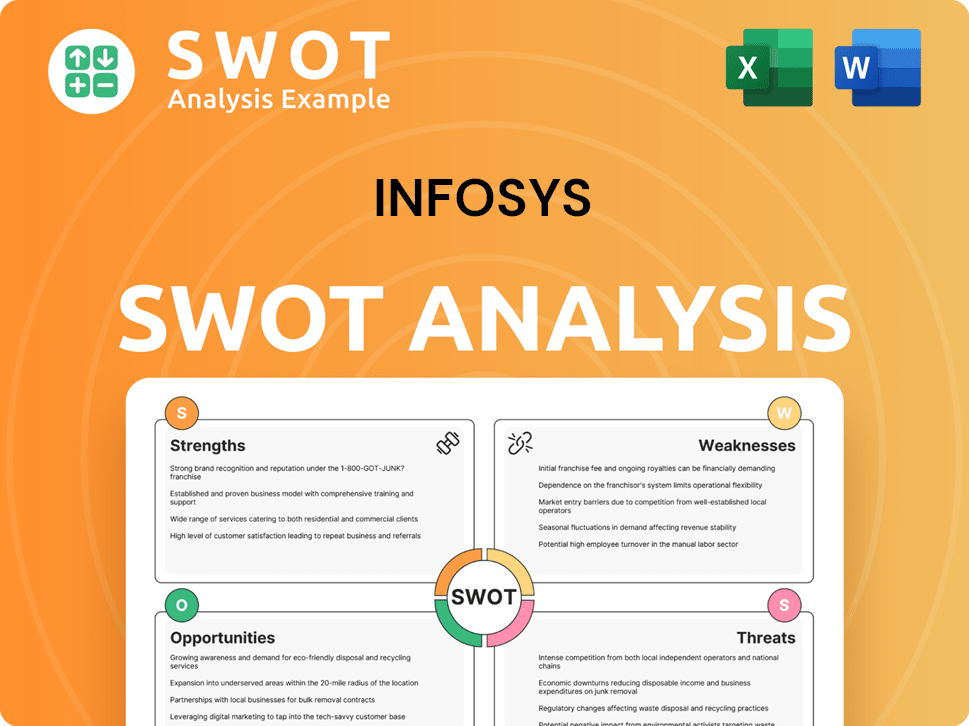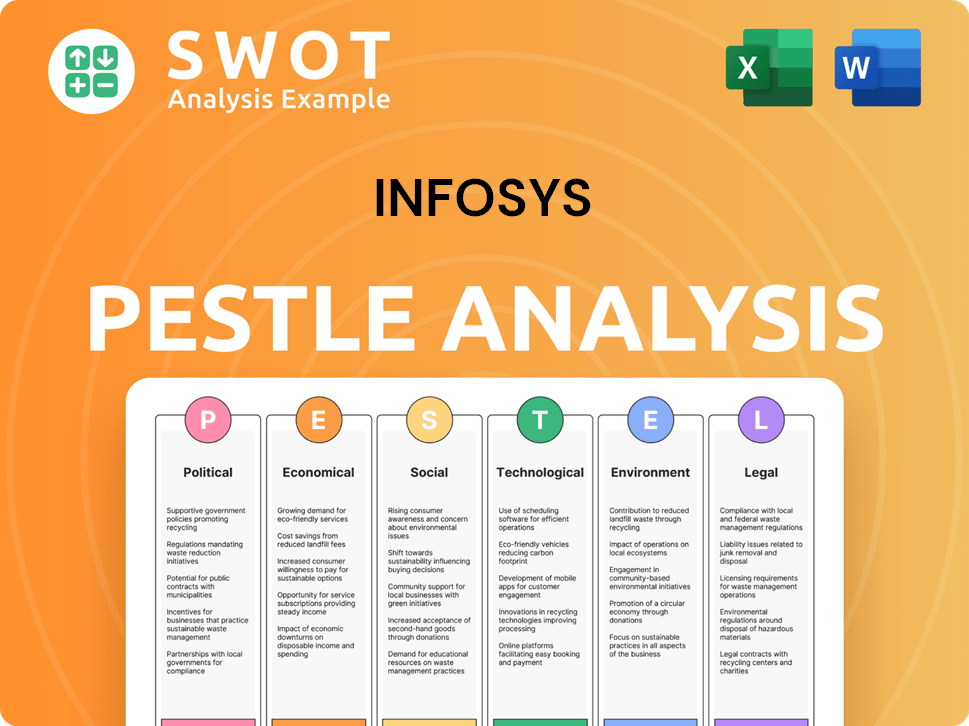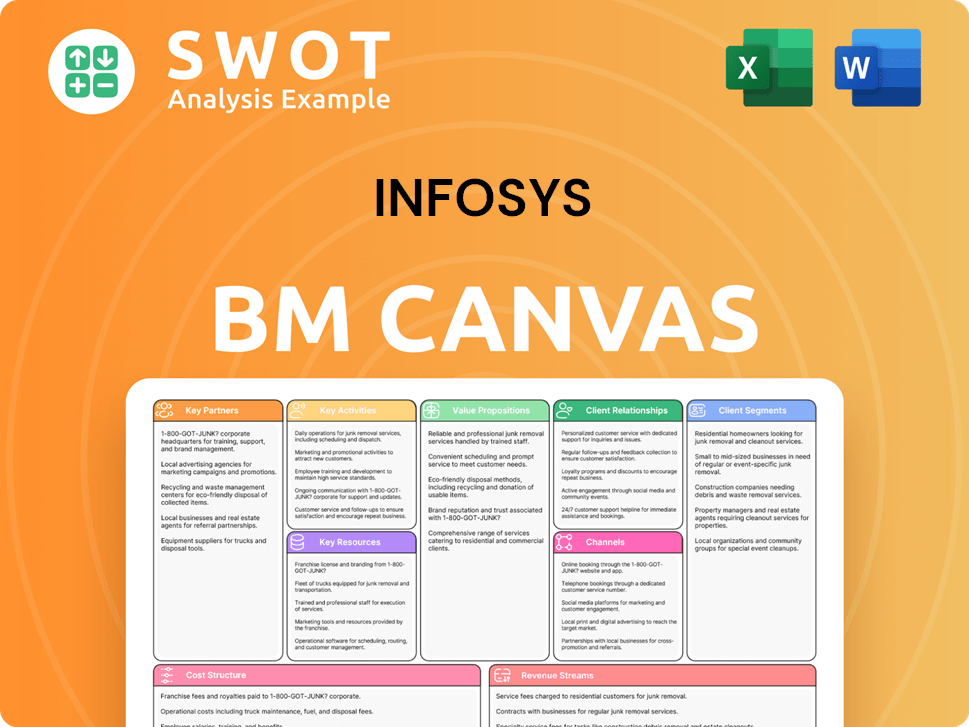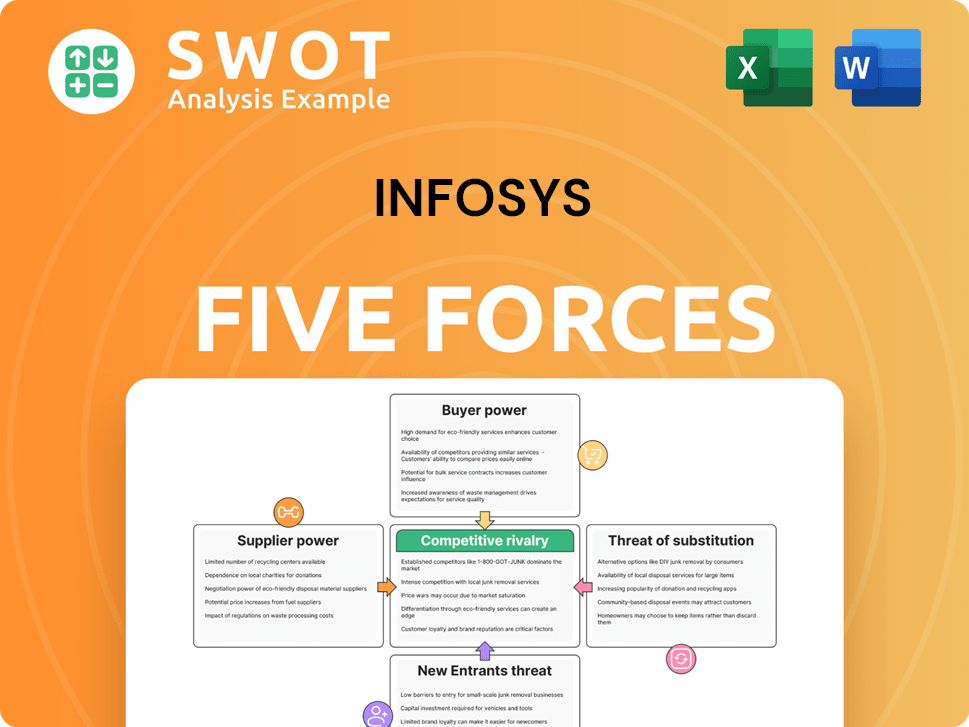Infosys Bundle
How Does Infosys Thrive in the Tech World?
Infosys, a global titan in digital services, is more than just an IT company; it's a catalyst for change. With a reported $19.28 billion in revenue for fiscal year 2025, and a presence in over 50 countries, Infosys is at the forefront of technological innovation. But how does this powerhouse actually operate, and what makes it tick?

To truly understand how Infosys works, we'll explore its core Infosys services, operational strategies, and Infosys business model. This deep dive will reveal the inner workings of Infosys company, from its company structure to its approach to digital transformation services, providing valuable insights for investors and industry watchers alike. For a detailed look at its strengths and weaknesses, consider the Infosys SWOT Analysis.
What Are the Key Operations Driving Infosys’s Success?
The Infosys company operates by providing a comprehensive suite of digital services and consulting. This enables clients across more than 50 countries to navigate their digital transformation journeys. Their core offerings include cloud computing, data analytics, artificial intelligence (AI), and cybersecurity, alongside traditional IT services and enterprise software solutions.
The company serves a diverse client base across various industries, including financial services, manufacturing, healthcare, and retail. Their operational processes are designed to deliver technology-led solutions that improve business performance and sustainability. This involves a strong emphasis on technology development and strategic partnerships with major cloud providers.
Infosys leverages platforms such as Infosys Live Operations (ILO) for process excellence and automation, integrating with legacy and digital environments to streamline operations. Their digital supply chain services provide end-to-end solutions in consulting, technology intervention, and managed services for supply chain planning. Infosys' commitment to innovation, particularly in AI and cloud, combined with its strong client-centric approach, makes it a unique player in the IT sector.
Infosys offers a wide range of services, including cloud computing, data analytics, AI, and cybersecurity. They also provide traditional IT services, automation, and enterprise software solutions. These services help clients across various industries improve their business performance and achieve digital transformation.
Infosys serves a diverse client base across industries like financial services, manufacturing, healthcare, and retail. Financial services are a significant revenue contributor. Their client-centric approach ensures that solutions are tailored to meet specific business needs, fostering long-term relationships.
Infosys uses platforms like Infosys Live Operations (ILO) for process excellence and automation. They integrate with both legacy and digital environments to streamline operations. This includes fulfillment, assurance, and billing processes, ensuring efficiency and cost-effectiveness for clients.
Infosys focuses on innovation, especially in AI and cloud technologies. They partner with major cloud providers like AWS, Microsoft Azure, and Google Cloud. These partnerships enhance their ability to offer holistic solutions and drive digital transformation for their clients.
Infosys' value proposition centers on delivering next-generation digital services and consulting. They help clients navigate digital transformation, improve business performance, and achieve sustainability. This is achieved through a combination of cutting-edge technology and a client-centric approach.
- Digital Transformation: Helping clients modernize their IT infrastructure and business processes.
- Innovation: Investing in AI, cloud, and other emerging technologies to create innovative solutions.
- Client-Centricity: Tailoring solutions to meet the specific needs of each client, fostering long-term relationships.
- Operational Efficiency: Streamlining operations through automation and process excellence.
The Infosys company continues to evolve, focusing on strategic investments and partnerships to enhance its service offerings. For more insights into how the company grows, consider exploring the Growth Strategy of Infosys. This approach allows Infosys to maintain a competitive edge in the dynamic IT market. In fiscal year 2024, Infosys reported revenues of approximately $18.2 billion, demonstrating its strong market position and continued growth. The company's focus on digital transformation services and strategic partnerships with cloud providers has been a key driver of this success.
Infosys SWOT Analysis
- Complete SWOT Breakdown
- Fully Customizable
- Editable in Excel & Word
- Professional Formatting
- Investor-Ready Format

How Does Infosys Make Money?
The Infosys company generates revenue primarily through its IT services offerings, with a growing focus on high-margin digital services. This approach has enabled the company to maintain a strong financial performance. The company's revenue streams are diversified across various service lines and geographical regions, contributing to its overall financial stability.
In fiscal year 2025, Infosys reported an annual revenue of $19.28 billion, reflecting a 3.86% year-over-year growth. The company's revenue for the fourth quarter of FY25 (ending March 31, 2025) reached ₹40,925 crore (approximately $4.73 billion), marking a 7.9% year-over-year increase. This growth is attributed to increased market demand and successful client acquisitions.
The Infosys business model focuses on providing a wide array of IT services, including cloud computing, artificial intelligence, data analytics, cybersecurity, and digital transformation solutions. These services are offered to clients across various industries, supporting their digital transformation journeys. The company's ability to adapt to evolving market demands and technological advancements is key to its continued success.
The company's monetization strategies involve securing large deal wins and expanding cloud services. These strategies are designed to enhance revenue streams and market opportunities. Strategic partnerships and acquisitions also play a crucial role in driving revenue growth.
- IT Services: Core services in application development, maintenance, and infrastructure management.
- Digital Transformation: Solutions for cloud, data analytics, AI, and cybersecurity.
- Cloud Services: Contributing 30% of revenue in FY25, growing by 25% annually.
- Large Deal Wins: In FY24, the company recorded its highest-ever deal total contract value (TCV) of US $17.6 billion. In Q1 FY25, the company reported 34 large deal wins with a total contract value of $4.1 billion.
- Geographical Diversification: North America accounts for approximately 60.8% of total revenue in Q1 FY25, with Europe and India showing strong growth.
- Strategic Partnerships and Acquisitions: Acquisitions like InSemi and in-tech enhance capabilities and revenue diversification.
Infosys PESTLE Analysis
- Covers All 6 PESTLE Categories
- No Research Needed – Save Hours of Work
- Built by Experts, Trusted by Consultants
- Instant Download, Ready to Use
- 100% Editable, Fully Customizable

Which Strategic Decisions Have Shaped Infosys’s Business Model?
The evolution of the Infosys company has been marked by significant achievements and strategic shifts. These moves have shaped its operational framework and financial performance, establishing its position in the IT sector. A core strategy involves expanding high-margin digital services, growing global delivery centers, and making strategic acquisitions, particularly in AI and automation, to enhance its capabilities.
Infosys has continually invested in emerging technologies and expanded its service offerings. This includes acquiring and partnering with niche tech firms to bolster its cloud capabilities, with recent investments in AI-driven platforms and alliances with cloud giants like AWS, Microsoft Azure, and Google Cloud. In Q1 FY25, Infosys completed the acquisition of in-tech, an engineering research and development service provider based in Germany, serving the automotive, rail transport, and other sectors. Furthermore, in Q4 FY25, Infosys announced plans to acquire The Missing Link, an Australian cybersecurity services specialist, and MRE Consulting, a technology and business consulting service provider in the US.
The Infosys business model is also influenced by economic conditions. Global macroeconomic uncertainty, high interest rates, and recession fears in the US (Infosys' largest market) have led clients to reduce discretionary spending. The collapse of Silicon Valley Bank also slowed deals in the financial services sector, a major revenue source for Infosys. Despite these challenges, Infosys achieved its highest-ever deal wins in FY24, with a total contract value of US $17.6 billion. The company is responding with a focus on cost efficiency and vendor consolidation, while maintaining its margin guidance.
Infosys has achieved notable milestones, including significant revenue growth and expansion into new markets. The company has consistently adapted to technological advancements, integrating new services and solutions to meet evolving client needs. Strategic acquisitions have played a crucial role in expanding its service portfolio and market reach.
Infosys has made strategic moves to enhance its capabilities and market position. These include investments in AI, cloud computing, and digital transformation services. The company has also focused on expanding its global presence and strengthening its partnerships with leading technology providers. These strategic moves have helped Infosys to stay competitive in the IT industry.
Infosys' competitive advantages include its strong brand reputation and technological expertise. The company benefits from economies of scale and a diverse client base. Infosys also maintains a broad global presence, operating in over 40 countries, which helps mitigate industry-specific volatility.
Infosys is focused on adapting to new trends and technology shifts. This includes investing in cutting-edge areas such as AI, machine learning, and blockchain. The company is also leveraging its Quantum Living Labs (QLL) to deliver quantum technology solutions. For more insights on the ownership structure, you can read about Owners & Shareholders of Infosys.
Infosys maintains a strong competitive position due to several factors. Its brand reputation is globally recognized for quality, with a brand value of $14 billion. Technological expertise in emerging areas like AI and cloud computing is a significant differentiator. The company also benefits from economies of scale, being the second-largest Indian IT company with a market cap of approximately $70 billion as of May 2024.
- Strong brand reputation and global recognition.
- Technological expertise in AI and cloud computing.
- Economies of scale and a diverse client base.
- Broad global presence in over 40 countries.
Infosys Business Model Canvas
- Complete 9-Block Business Model Canvas
- Effortlessly Communicate Your Business Strategy
- Investor-Ready BMC Format
- 100% Editable and Customizable
- Clear and Structured Layout

How Is Infosys Positioning Itself for Continued Success?
The Infosys company holds a significant position in the global IT services sector, ranking as the second-largest IT services firm in India. It serves a vast clientele, including about 185 of the Fortune 500 companies, and has a substantial global footprint, with operations in over 50 countries. This strong market position is supported by its consistent performance and dedication to understanding and meeting client needs. Its main competitors include Tata Consultancy Services (TCS), Accenture, Wipro, IBM, and Capgemini.
Despite its strong position, Infosys faces several key risks and challenges. These include macroeconomic uncertainties, such as high interest rates and recession fears in the US, which can lead to cautious client spending. Geopolitical tensions, tariffs, and trade wars also compel companies to diversify sourcing, potentially impacting supply chains and revenue. Intensified competition within the IT services industry, along with potential regulatory changes and technological disruption, pose ongoing challenges. Cybersecurity threats are also a pressing concern, requiring continuous adaptation and resilience planning. For a better understanding of the competitive landscape, consider reading about the Competitors Landscape of Infosys.
Infosys is a leading IT company, known for its comprehensive services and global presence. It is a major player in the IT sector, serving a wide range of industries. The company has a strong reputation for delivering high-quality services and innovative solutions to its clients.
The company faces risks from global economic conditions and geopolitical tensions. These factors influence client spending and the need for diversified sourcing. Cybersecurity threats and technological disruptions also present ongoing challenges for Infosys.
Infosys is focused on sustained growth through strategic initiatives, particularly in AI and cloud computing. The company is expanding its cloud services and enhancing capabilities in edge computing. Leadership emphasizes client-centricity and responsiveness to market changes.
Infosys expects a better FY25, with a net profit of approximately $815 million. Revenue growth guidance for FY25 has been revised to 4.5-5% in constant currency. For FY26, the company projects a more modest revenue growth of 0-3% due to ongoing macroeconomic uncertainties.
Infosys is investing heavily in AI, cloud computing, and other emerging technologies. The company is also focused on expanding its cloud services and enhancing capabilities in areas like edge computing and 5G infrastructure. Infosys aims to become climate positive by 2030, integrating sustainability into its operations.
- Focus on AI and cloud computing to drive innovation.
- Expansion of cloud services with a 'chip-to-cloud' strategy.
- Emphasis on client-centricity and market responsiveness.
- Commitment to sustainability and achieving climate positivity by 2030.
Infosys Porter's Five Forces Analysis
- Covers All 5 Competitive Forces in Detail
- Structured for Consultants, Students, and Founders
- 100% Editable in Microsoft Word & Excel
- Instant Digital Download – Use Immediately
- Compatible with Mac & PC – Fully Unlocked

Related Blogs
- What are Mission Vision & Core Values of Infosys Company?
- What is Competitive Landscape of Infosys Company?
- What is Growth Strategy and Future Prospects of Infosys Company?
- What is Sales and Marketing Strategy of Infosys Company?
- What is Brief History of Infosys Company?
- Who Owns Infosys Company?
- What is Customer Demographics and Target Market of Infosys Company?
Disclaimer
All information, articles, and product details provided on this website are for general informational and educational purposes only. We do not claim any ownership over, nor do we intend to infringe upon, any trademarks, copyrights, logos, brand names, or other intellectual property mentioned or depicted on this site. Such intellectual property remains the property of its respective owners, and any references here are made solely for identification or informational purposes, without implying any affiliation, endorsement, or partnership.
We make no representations or warranties, express or implied, regarding the accuracy, completeness, or suitability of any content or products presented. Nothing on this website should be construed as legal, tax, investment, financial, medical, or other professional advice. In addition, no part of this site—including articles or product references—constitutes a solicitation, recommendation, endorsement, advertisement, or offer to buy or sell any securities, franchises, or other financial instruments, particularly in jurisdictions where such activity would be unlawful.
All content is of a general nature and may not address the specific circumstances of any individual or entity. It is not a substitute for professional advice or services. Any actions you take based on the information provided here are strictly at your own risk. You accept full responsibility for any decisions or outcomes arising from your use of this website and agree to release us from any liability in connection with your use of, or reliance upon, the content or products found herein.